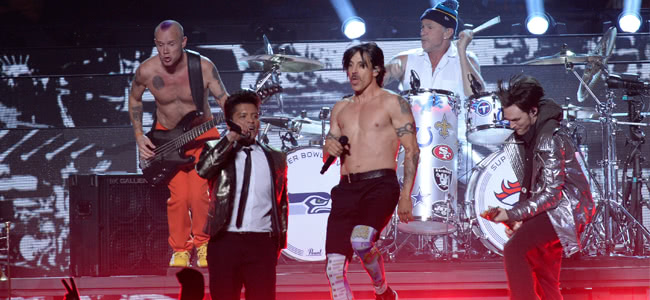Should artists be paying for the privilege of performing at one of the biggest gigs in the world?
That’s the question that’s surfaced following reports that the organisers of America’s Super Bowl – possibly the most watched sporting event in the world – have approached some big-name musicians to play next year’s half-time show – as long as they make a significant “financial contribution” for the honour.
There’s no arguing the mass appeal and exposure the slot brings, this year’s unlikely team-up between Red Hot Chili Peppers and Bruno Mars was one of the most talked about media events (largely due to accusations the Peppers’ had mimed their performance, before bassist Flea confirmed as much) as well as the most watched.
The 13-minute performance drew 115.3 million viewers – more than the Super Bowl match itself (at 111.5 million) – its ratings far outpacing equally blockbuster events like the 2014 Oscars (43.74m viewers) and the Grammys (28.51m).
What mainstream artist wouldn’t want that kind of high-profile exposure? Except it seems that there can be too high a price-tag on such a high-profile platform.
According to The Wall Street Journal, the NFL has approached Coldplay, Katy Perry, and Rihanna as their top choices to perform at the Super Bowl 2015 half-time show, offering the coveted gig in exchange for a portion of the league receiving a portion of the musicians’ post-Super Bowl tour profits, or “make some other type of financial contribution,” as WSJ‘s Hannah Karp writes.
[include_post id=”373924″]
Perhaps unsurprisingly, Karp notes that the NFL received “a chilly reception from the candidates’ representatives” when offered the chance to essentially buy their way onto the Super Bowl XLIX half-time gig, taking place near Phoenix, Arizona on 1st February, 2015.
The leagues’ contracts with half-time performers are strictly confidential, but it’s widely understood that the NFL typically covers artists’ travel and production expenses – usually in the million dollar mark – but doesn’t traditionally pay a fee for the Super Bowl appearance.
Love Music?
Get your daily dose of metal, rock, indie, pop, and everything else in between.
Still, it’s no secret that musicians generally benefit from the top-tier sports gig; Beyoncé announced her ‘Mrs. Carter’ world tour following her 2013 half-time show to storming global sales, while sales of Bruno Mars’ Unorthodox Jukebox album jumped by 164% after playing with the Chili Peppers this past February.
The NFL’s mistake however may not have been their new ‘pay to perform’ offer, but instead the musicians they were offering it to.
[include_post id=”383703″]
Two of the acts that turned the league down are already million-dollar grossing touring acts in their own right – Rihanna had the fifth highest grossing tour of 2013, raking in nearly $138 million from 87 global dates (84 of which were sell outs); Coldplay are among rare company as one of the 25 highest selling touring bands since 1990.
You don’t need hardcore maths to deduce that should either have taken the NFL up on their terms, it’d be difficult to see the post-half-time show effects would have on their burgeoning tour profits and in turn, giving a “portion” of them to the league would automatically mean forfeiting millions of dollars.
As for Katy Perry, she’s no touring slouch herself (Pollstar wages she made $36m between May and July from ticket sales), but she hardly needs the Super Bowl exposure.
Her latest album, Prism is among the Top 10 selling albums of the year in the US (in Australia’s it’s in the Top 5) while her music video for ‘Dark Horse’ is the most watched music clip on YouTube so far this year. Since being uploaded in February, the video has cracked well over 530 million views – yep, nearly five times that of the Super Bowl’s 2014 TV audience.

































